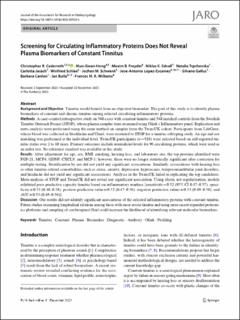| dc.description.abstract | Background and Objective
Tinnitus would benefit from an objective biomarker. The goal of this study is to identify plasma biomarkers of constant and chronic tinnitus among selected circulating inflammatory proteins.
Methods
A case–control retrospective study on 548 cases with constant tinnitus and 548 matched controls from the Swedish Tinnitus Outreach Project (STOP), whose plasma samples were examined using Olink’s Inflammatory panel. Replication and meta-analysis were performed using the same method on samples from the TwinsUK cohort. Participants from LifeGene, whose blood was collected in Stockholm and Umeå, were recruited to STOP for a tinnitus subtyping study. An age and sex matching was performed at the individual level. TwinsUK participants (n = 928) were selected based on self-reported tinnitus status over 2 to 10 years. Primary outcomes include normalized levels for 96 circulating proteins, which were used as an index test. No reference standard was available in this study.
Results
After adjustment for age, sex, BMI, smoking, hearing loss, and laboratory site, the top proteins identified were FGF-21, MCP4, GDNF, CXCL9, and MCP-1; however, these were no longer statistically significant after correction for multiple testing. Stratification by sex did not yield any significant associations. Similarly, associations with hearing loss or other tinnitus-related comorbidities such as stress, anxiety, depression, hyperacusis, temporomandibular joint disorders, and headache did not yield any significant associations. Analysis in the TwinsUK failed in replicating the top candidates. Meta-analysis of STOP and TwinsUK did not reveal any significant association. Using elastic net regularization, models exhibited poor predictive capacity tinnitus based on inflammatory markers [sensitivity = 0.52 (95% CI 0.47–0.57), specificity = 0.53 (0.48–0.58), positive predictive value = 0.52 (0.47–0.56), negative predictive values = 0.53 (0.49–0.58), and AUC = 0.53 (0.49–0.56)].
Discussion
Our results did not identify significant associations of the selected inflammatory proteins with constant tinnitus. Future studies examining longitudinal relations among those with more severe tinnitus and using more recent expanded proteomics platforms and sampling of cerebrospinal fluid could increase the likelihood of identifying relevant molecular biomarkers. | en_US |

